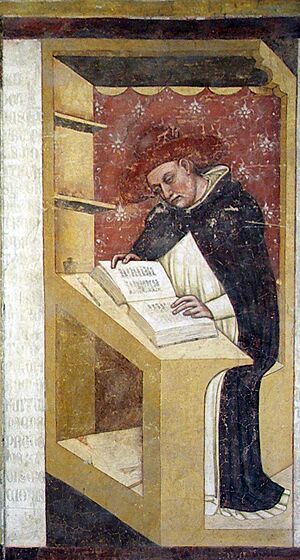Nicolò Albertini facts for kids
Quick facts for kids Nicolò Albertini |
|
|---|---|
| Cardinal-Bishop of Ostria | |

A fresco of Cardinal Albertini by Tommaso da Modena at the church of Saint Nicholas in Treviso
|
|
| Church | Catholic Church |
| Diocese | Diocese of Ostria |
| Enthroned | 18 December 1303 |
| Reign ended | 27 April 1321 |
| Predecessor | Nicola Boccasini |
| Successor | Regnaud de La Porte |
| Other posts | Dean of the College of Cardinals (1312-1321) |
| Orders | |
| Created Cardinal | 18 December 1303 by Pope Benedict XI |
| Rank | Cardinal-Bishop |
| Personal details | |
| Birth name | Nicolò Albertini |
| Born | 1250 Prato, Tuscany |
| Died | 27 April 1321 (aged 70–71) Avignon, France |
| Previous post |
|
Nicolò Albertini (born around 1250 – died April 27, 1321) was an important Italian Dominican friar. He was also a skilled statesman and a Cardinal in the Catholic Church.
Contents
Early Life and Education
Nicolò Albertini was born around 1250 in a city called Prato, which is in Tuscany, Italy. His parents came from important families in the region.
His parents guided his early education. When he was 16, in 1266, he joined the Dominican Order. This meant he became a friar, dedicating his life to God. The next year, he went to the University of Paris to continue his studies.
A Busy Career in the Church
Becoming a Leader
Albertini became a popular preacher across Italy. His lessons on theology, which is the study of religious faith, were very well attended, especially in Florence and Rome. He also taught at a special school in Rome.
His leaders gave him many important jobs. He managed several Dominican houses and later became the main leader for the Dominican Order in the Roman Province.
Working for the Pope
In 1299, Pope Boniface VIII made him the Bishop of Spoleto. Soon after, the Pope sent him as a special messenger, called a Papal Legate, to the Kings of France and England. These kings, Philip IV and Edward I, were fighting. Albertini's job was to help them make peace.
Surprisingly, Albertini succeeded in his mission. The Pope was very grateful and thanked him publicly. He then made Albertini the Vicar of Rome, which meant he was the Pope's representative in the city.
Becoming a Cardinal
Pope Benedict XI was very close to Albertini. They had lived together in the same monastery for a long time. Soon after Benedict XI became Pope in 1303, he made Albertini a Cardinal-Bishop of Ostia. Albertini held this important position for nearly 18 years.
During the 13th and 14th centuries, many parts of Italy were suffering from civil wars. The Pope again asked Albertini to be an Apostolic Legate. His mission was to bring peace back to these troubled areas, including Tuscany and other regions.
Important Missions and Decisions
Albertini was welcomed in Florence. However, he tried many times to make peace between two rival groups, the Guelphs and the Ghibellines, but he failed. Because of this, he left the city and placed it under an interdict. An interdict meant that certain church services were not allowed there.
In 1312, Albertini had a very important role. He crowned Henry of Luxembourg as the Holy Roman Emperor in Rome, acting on behalf of Pope Clement V. He also served as the main judge in a trial that cleared a friar accused of poisoning Henry VII.
Later, he crowned Robert of Naples as the King of Sicily.
Leading the Cardinals
From 1314 to 1316, Albertini was part of the papal conclave. This was a meeting where cardinals elected a new Pope. This conclave was the longest in history, lasting over two years. It eventually elected Pope John XXII.
Albertini was the Dean of the College of Cardinals from 1312 until he died. This meant he was the leader of all the cardinals. He passed away in Avignon, France, and was buried in the Dominican Church there.
Helping Others
Cardinal Albertini was known for his great kindness and love for poor people, especially those in his hometown of Prato. He also gave a lot of money to religious houses and helped build churches. In Avignon, he started a community of nuns. He also made sure that a Dominican friar would always hold the important position of Master of the Sacred Palace, a key advisor to the Pope.
Writings
Nicolò Albertini wrote two short books. One was about paradise, and the other was about how bishops should hold their meetings.
 | Emma Amos |
 | Edward Mitchell Bannister |
 | Larry D. Alexander |
 | Ernie Barnes |

